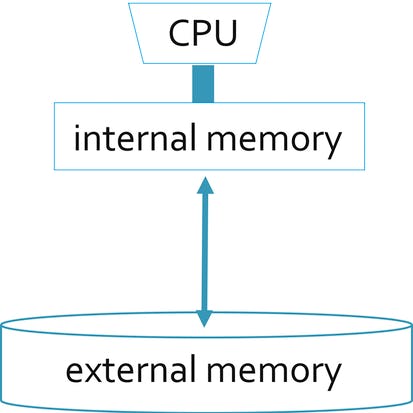- Level Expert
- Duration 10 hours
- Course by EIT Digital
-
Offered by

About
Operations on data become more expensive when the data item is located higher in the memory hierarchy. An operation on data in CPU registers is roughly a million times faster than an operation on a data item that is located in external memory that needs to be fetched first. These data fetches are also called I/O operations and need to be taken into account during the design of an algorithm. The goal of this course is to become familiar with important algorithmic concepts and techniques needed to effectively deal with such problems. We will work with a simplified memory hierarchy, but the notions extend naturally to more realistic models. Prerequisites: In order to successfully take this course, you should already have a basic knowledge of algorithms and mathematics. Here's a short list of what you are supposed to know: - O-notation, Ω-notation, Θ-notation; how to analyze algorithms - Basic calculus: manipulating summations, solving recurrences, working with logarithms, etc. - Basic probability theory: events, probability distributions, random variables, expected values etc. - Basic data structures: linked lists, stacks, queues, heaps - (Balanced) binary search trees - Basic sorting algorithms, for example MergeSort, InsertionSort, QuickSort - Graph terminology, representations of graphs (adjacency lists and adjacency matrix), basic graph algorithms (BFS, DFS, topological sort, shortest paths) The material for this course is based on the course notes that can be found under the resources tab. We will not cover everything from the course notes. The course notes are there both for students who did not fully understand the lectures as well as for students who would like to dive deeper into the topics. The video lectures contain a few very minor mistakes. A list of these mistakes can be found under resources. If you think you found an error, report a problem by clicking the square flag at the bottom of the lecture or quiz where you found the error.Modules
1.1 Introduction
1
Videos
- Why I/O-efficient Algorithms
1.2 The basic I/O-model
1
Videos
- The basic I/O-model
1.3 Analyzing algorithms in the I/O-model
1
Videos
- Analyzing algorithms in the I/O-model
1.4 Analyzing algorithms in the I/O-model, II
1
Videos
- Analyzing algorithms in the I/O-model, II
1.5 Cache-aware versus cache-oblivious algorithms
1
Videos
- Cache-aware versus cache-oblivious algorithms
1.6 Quiz
1
Assignment
- Introduction
1
Readings
- Course notes 1.1 and 1.2
2.1 The matrix-transposition problem
1
Videos
- The matrix-transposition problem
2.2 A cache-aware algorithm for matrix transposition
1
Videos
- A cache-aware algorithm for matrix transposition
2.3 A cache-oblivious algorithm for matrix transposition
1
Videos
- A cache-oblivious algorithm for matrix transposition
2.4 Quiz
1
Assignment
- Designing cache-aware and cache-oblivious algorithms
1
Readings
- Course notes 1.3
3.1 Replacement Policies
1
Videos
- Replacement Policies
3.2 Quiz
1
Assignment
- Replacement policies
1
Readings
- Course notes 1.4
4.1 I/O-Efficient sorting, I
1
Videos
- I/O-Efficient sorting, I
4.2 I/O-Efficient sorting, II
1
Videos
- I/O-Efficient sorting, II
4.3 Quiz
1
Assignment
- I/O-efficient sorting
1
Readings
- Course notes chapter 2
5.1 Efficient searching I: B-Trees
1
Videos
- Efficient searching I: B-Trees
5.2 Efficient searching II: Buffer Trees
1
Videos
- Efficient searching II: Buffer Trees
5.3 I/O-Efficient Priority queues
1
Videos
- I/O-Efficient Priority queues
5.4 Quiz
1
Assignment
- I/O-Efficient Data Structures
1
Readings
- Course notes 3.1
6.1 Evaluating local functions on a dag
1
Videos
- Evaluating local functions on a DAG
6.2 Evaluating local function on a dag: I/O-analysis
1
Videos
- Evaluating local function on a DAG: I/O-analysis
6.3 Time-forward processing
1
Videos
- Time-forward processing
6.4 Computing maximal independent sets
1
Videos
- Computing maximal independent sets
6.5 Quiz
1
Assignment
- I/O-EFFICIENT FUNCTION EVALUATION ON A DAG
1
Readings
- Course notes 3.2
Auto Summary
Explore the fascinating realm of I/O-efficient algorithms in this expert-level course, perfect for data science and AI enthusiasts. Led by a proficient instructor, this course delves into algorithms designed to handle massive datasets that exceed main memory capacity, crucial for large-scale data processing and database management. With a solid foundation in algorithms, mathematics, and basic data structures, you'll learn to navigate memory hierarchies and optimize data fetches. The course spans 600 minutes, with both Starter and Professional subscription options available, providing comprehensive resources and in-depth knowledge to enhance your algorithmic skills.

Mark de Berg


